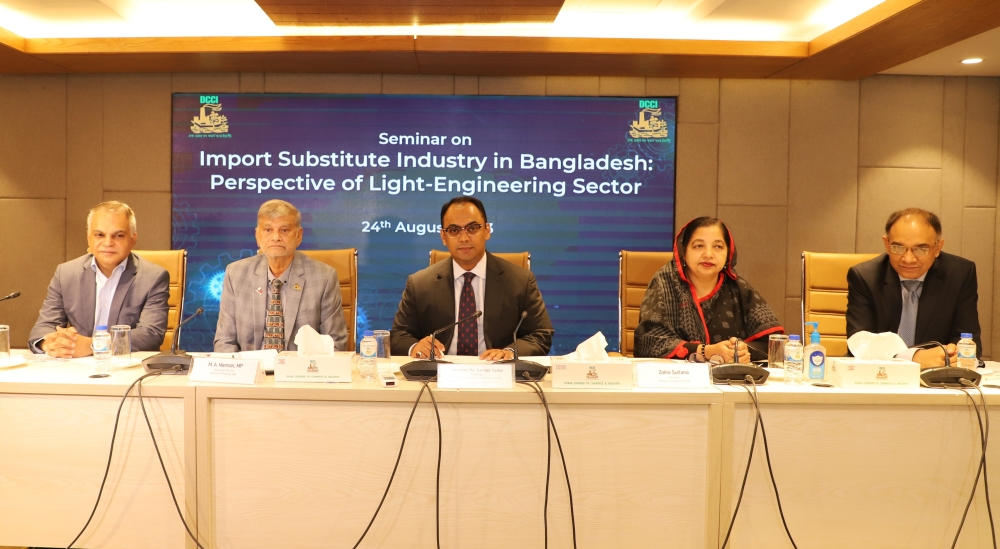News
Seminar on Import Substitute Industry in Bangladesh: Perspective of Light Engineering Sector

Light Engineering sector, if given right policy support, can serve as the backward linkage industry to many mainstream local industries like food, leather and footwear, electronics, agro-processing and pharmaceuticals industries, told Barrister Md. Sameer Sattar, President of Dhaka Chamber of Commerce & Industry (DCCI) at a Seminar on “Import Substitute Industry in Bangladesh: Perspective of Light Engineering Sector” held at DCCI on August 24, 2023. He also said that recognizing light engineering sector as a high-priority sector in the Industrial Policy 2022 to provide sufficient incentives to ensure substantial growth of the sector. To secure the target of private investment to 27.35% of GDP by FY 2025, development of the light engineering sector is crucial as it will strengthen local value and supply chain in many allied industries. The current tariff structure on import of light engineering products is counter-productive for the growth of the local light engineering sector. In this regard, a study is needed to know further the needs and bring appropriate changes in the tariff structure that will protect this sector.
In the seminar, Planning Minister M. A. Mannan, MP was present as the Chief Guest while Zakia Sultana, Secretary, Ministry of Industries was present as the Special Guest. DCCI President Barrister Md. Sameer Sattar chaired the seminar.
Planning Minister M A Mannan, MP said that in the light engineering sector if Korea, Taiwan, Malaysia, China could make success then Bangladesh will also be succeeded in future and we are in the right track. He agreed that there are challenges but the private sector of Bangladesh is resilient enough to overcome these challenges and from the government all possible policy support will be given, he assured. Inconsistency among the government agencies regarding different policies is not good for private sector, he agreed. He said that if we can formalize the local small light engineering hub at Dholaikhal and Jingira, one day they will be able to contribute to the economy. He also urged for policy consistency and later said that at present the public-private partnership and relationship are at its best as the government is very business friendly.
Zakia Sultana, Secretary, Ministry of Industries, said that Bangladesh’s light engineering sector is still import based. The light engineering sector is an untapped sector and it has great prospects of creating a large backward linkage industry ensuring diversified industrial base. The light engineering industry development policy 2022 has already indicated a comprehensive action plan for 2022-2027. She also said that the entrepreneurs of this sector should be incentivized to mitigate import reliance. She also said that government will try to boost policy harmonization and coordination among the concerned agencies. She said that for capacity building skill development and curriculum upgradation are necessary. Government is also planning to establish an Automobile Research Institute in Narayangonj with the help of Japan, she added.
Additional Managing Director, Walton S.M. Shoyeb Hossain Nobel presented the keynote paper. He highlighted that the light engineering sector of Bangladesh is generating revenue of 20,000 crore taka and contributes about 3% to the GDP and it is increasing at 10% every year. The world market is of about USD 45 billion. About 1.6 million people are employed in this sector. 50% of our local demand is met by this sector, he added. In FY 2021-22 the export of light engineering sector was USD 796 million. He said that this sector is completely import based therefore he demanded for separate duty structure and backward linkage industry policy for this sector. Lack of easy access to finance, quality of products, demand uncertainty, policy inconsistency, no incentives for local manufacturers, lack of lab and R&D, data of actual demand are few of the challenges of this sector, he said.
In the panel discussion session, President of Bangladesh Steel Manufacturers Association Manwar Hossain said that now we have to focus on other promising sectors other than RMG. He also said that our investment in human capital is still poor. He also urged for increasing cash incentives to this sector. Chief Marketing Officer, Fair Group, Mohammad Mesbah Uddin said that the light engineering market by the year 2030 will reach to USD 10 billion. He also urged for value addition as there is a huge scope of investment opportunity. He also emphasized on policy guidelines and developing science and technology based education system in the country and long-term policy consistency. Director, Meghna Group Muhammad Mushtaque Ahmed Tanvir said that there is a demand of 5 million bicycles in the European market. At present we need investment in the local manufacturing of mold and dies because it costs huge for import. Managing Director & CEO, Transcom Electronics Limited Arshad Huq said Bangladesh’s consumer market is ready. Many global brands want to come in Bangladesh and invest. But he emphasized on quality of products that need to be maintained. He informed that a US company Whirlpool has invested in Bangladesh in the form of joint venture. He stressed on policy consistency and developing human resource. Former President, DCCI Matiur Rahman said that import duty of this sector should be reduced. He also put emphasis on long- term policy and skill development and more technical and vocational trainings. A wing of Ministry of Industries can be established at the NBR, he suggested. Government can initiate establishing testing labs and R&D for the future growth of this sector, he added.
DCCI’s Senior Vice President SM Golam Faruk Alamgir (Arman) gave vote of thanks. DCCI Vice President Md. Junaed Ibna Ali was also present on the occasion.
Published on: 2023-08-24
